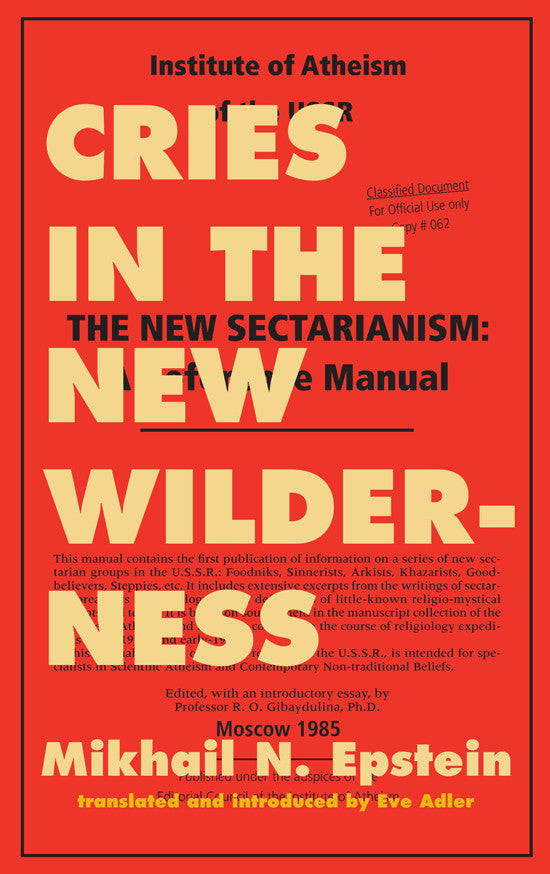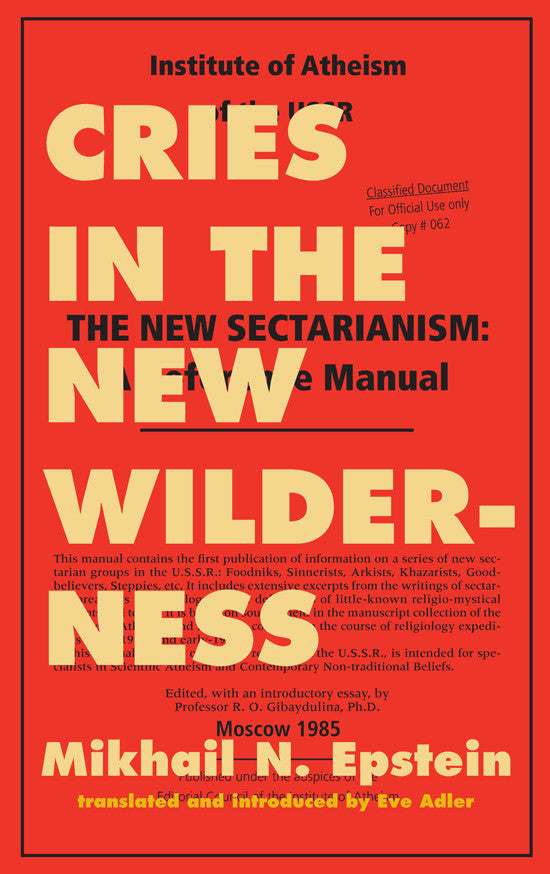Cries in the New Wilderness
Cries in the New Wilderness
Mikhail N. Epstein
Couldn't load pickup availability
236 pages, available as a paperback or hardback / 5.75" x 9" / ISBN 978-0-9679675-5-4 / Publication Date: August 2002
Inside the disintegrating Soviet Union, a professor compiles "The New Sectarianism," a classified manual of manifestos, articles, and sermons by members of banned religious sects—from the mystical Thingwrights and the absurdist Folls to the messianic Khazarists and the doomsday Steppies. Cries in the New Wilderness is filled with the voices of these groups. As a counterpoint to this medley of comic, grotesque, poetic, banal, poignant, and harrowing voices is the voice of the commentator, Professor Gibaydulina, who struggles to maintain the purity and objectivity of her scientific atheism in the face of an amazing variety of religious experiences. Epstein's depiction of the inner drama of Gibaydulina's response to the crumbling of the Soviet Union and her quest for a new, creative atheism adds a tragic note to his polyphonic work.
Cries in the New Wilderness is a work of extraordinary artistic and philosophical imagination, begun in Moscow in the mid-1980s and now available for the first time in English translation in an expanded version. Drawing on his own participation in Moscow's intellectual associations and in expeditions to study popular religious beliefs in southern Russia and Ukraine, Epstein recreates the spiritual experience of a whole Russian generation. His is not a documentary book, however, but a "comedy of ideas," in which he constructs from the voices he hears in the culture around him the religious and philosophical worldviews of Foodniks and Domesticans, Arkists and Bloodbrothers, Atheans and Good-believers, Steppies and Pushkinians.
An award-winning essayist and critic, Mikhail Epstein has been compared to Jorge Luis Borges for his literary inventiveness and to Walter Benjamin for his acute observation of cultural phenomena. Transcending genres and disciplines, Cries in the New Wilderness is a brilliantly original work, a "virtual document" that illuminates the spiritual condition of the Soviet Union as it reveals unsuspected affinities between Russian and American culture. In the mirror of Soviet society, we recognize our own enthusiasm for alternative spiritual experiences, our worship of technology, our doomsday cults. We may also recognize that we ourselves are participants in many of the sects Mikhail Epstein describes, sects that seem at first fantastic and outlandish, but prove to be the religious basis of our own lives.
"The prolific, inexhaustibly inventive Mikhail Epstein has produced a novel — almost. Cries in the New Wildnerness is fiction, but (according to Epstein's own philosophy of 'possibilism') not untrue: it has merely realized some of the vital potentials of post-atheistic Russian culture, where people thirst for a faith that can sacralize everyday practices while at the same time endorse a transcendent Whole. Whether you do Russia for a living or simply love the spectacle of dullness broken up into a thousand crazy glittering points of light, you will recognize, in reading it, a passion of your own." —Caryl Emerson, Princeton University
"Mikhail Epstein is probably the most important figure in Russian literary theory in the post-Bakhtin, post-Lotman era. What he has to say is of great interest to everyone interested in cultural studies." —Walter Laqueur, Chairman, Center for Strategic and International Studies
"Borgesian in its design, Cries in the New Wilderness is the best example of that rare genre of theological fantasy that strikes a precise equilibrium between search for God and struggle against God." —Alexander Genis, author of Red Bread
"Cries in the New Wilderness presents a completely new view of the spiritual life of Russian society…The book is full of tragicomic tension and brings to mind the multivoiced novels of Dostoevsky." —Ilya Kabakov
Mikhail Epstein was born in Moscow in 1950 and graduated from Moscow State University summa cum laude in philology in 1972. He was the founder and director of the Laboratory of Contemporary Culture in Moscow. In 1990 Epstein moved to the United States, where he spent a year in Washington, DC, as a fellow at the Woodrow Wilson International Center. He is now Samuel Candler Dobbs Professor of Cultural Theory and Russian Literature at Emory University.
Epstein's recent books in English include After the Future: Paradoxes of Postmodernism and Contemporary Russian Culture; Russian Postmodernism: New Perspectives on Post-Soviet Culture (with two coauthors); and Transcultural Experiments: Russian and American Models of Creative Communication (with Ellen Berry). He is the author of 15 books and approximately 400 essays and articles, translated into 14 languages.
In 2000 Mikhail Epstein was the recipient of the Liberty Prize, established in 1999 and awarded once a year to prominent Russian cultural figures who have made an outstanding contribution to American society. He has also received among many other awards the 1995 Social Innovations Award from the Institute for Social Inventions (London) for his electronic Bank of New Ideas, and the 1991 Andrei Belyi Prize (St. Petersburg) for the best work in literary criticism and scholarship.
Eve Adler is professor of classics at Middlebury College and is the translator of several books, including Dictionary of Russian Slang & Colloquial Expressions.


